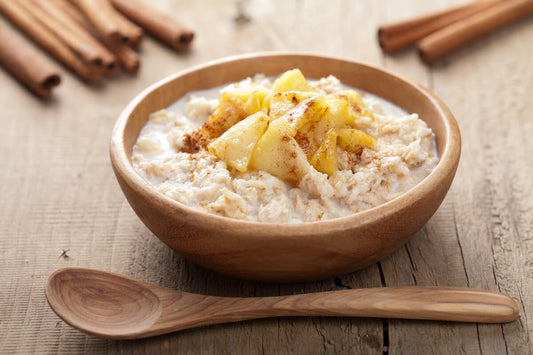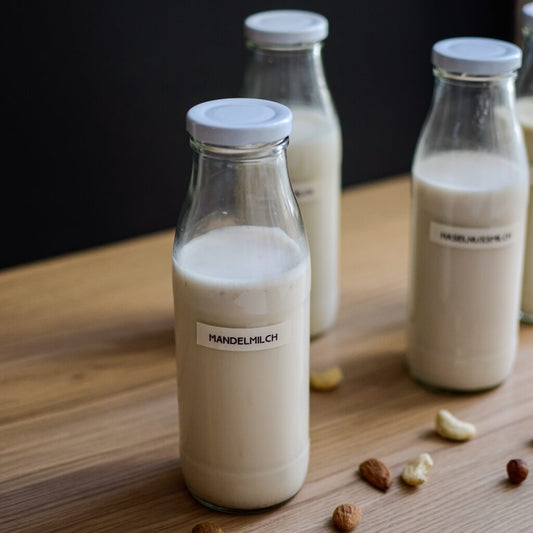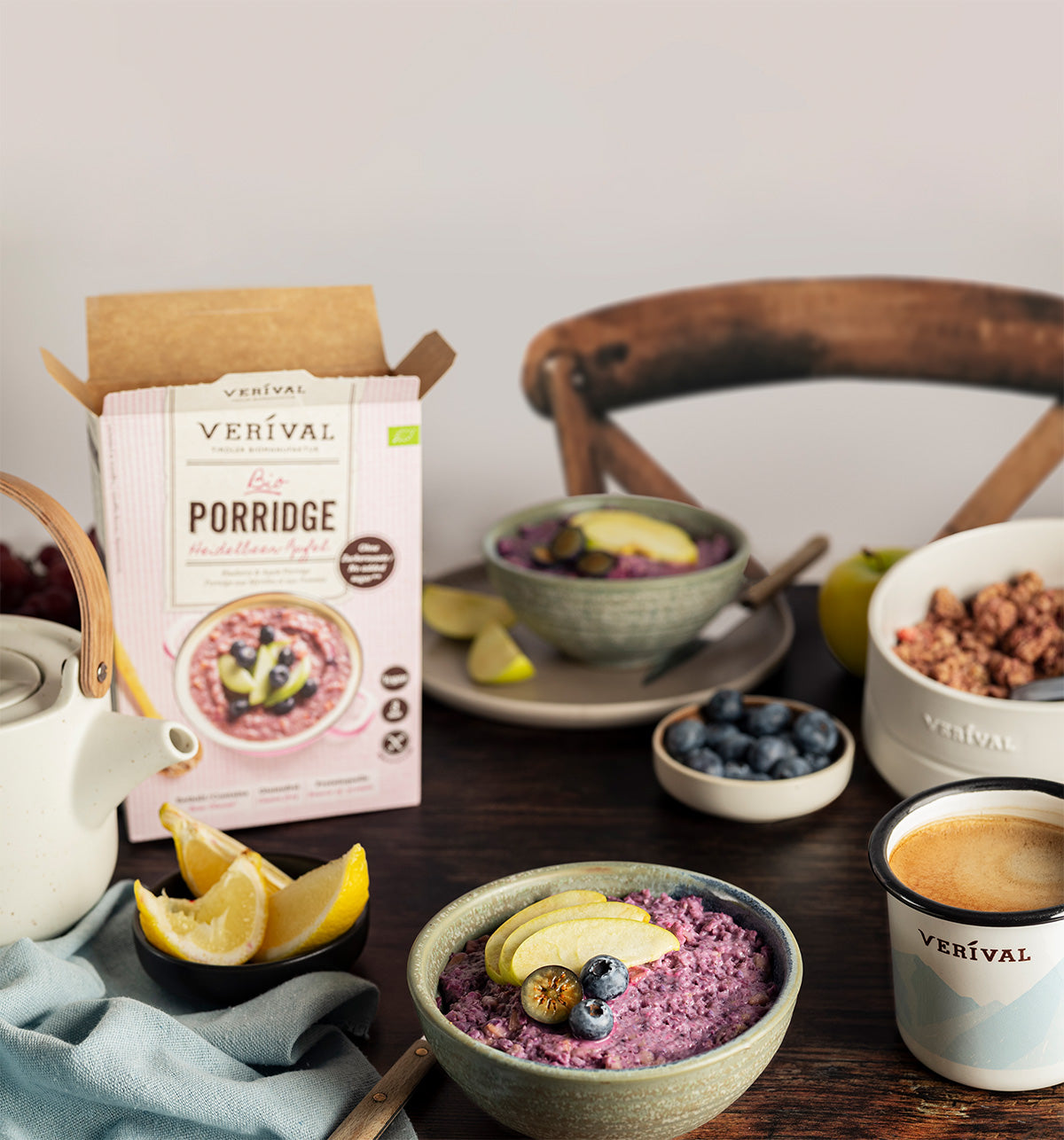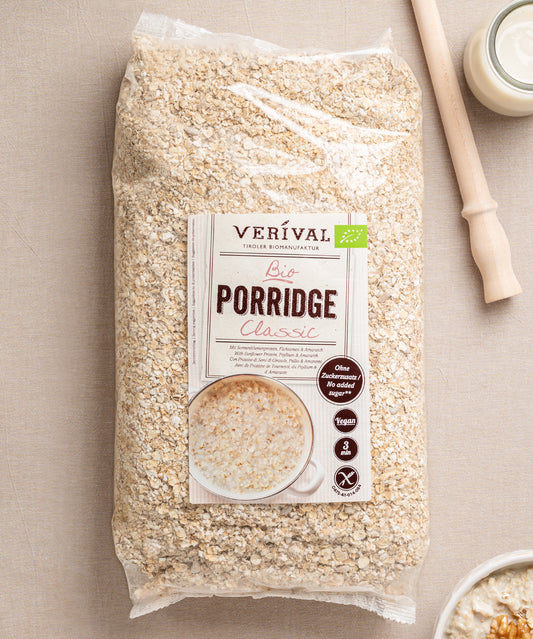
Use the free calorie calculator!
Calculate your calorie requirements
Calorie calculator – how many calories do I need to maintain my weight? With our calculator, you can easily work out your calorie requirement and find out how much you can eat to lose weight.

Our free calorie calculator
With our calorie calculator you can easily determine and calculate this. In the article you will also find out which foods will help you optimally meet your daily requirements.
We at Verival are breakfast fans and are convinced that porridge or porridge for breakfast can help you optimize your calorie consumption.
-
Protein Porridge Cocoa-Banana
4.87 / 5.0
4.87 31 total reviews
Regular price 69 SEKRegular priceUnit price 197 SEK / per 1000g3 Sizes available
-
Protein Porridge Raspberry-Cocoa
4.95 / 5.0
4.95 21 total reviews
Regular price 69 SEKRegular priceUnit price 173 SEK / per 1000g2 Sizes available
-
Strawberry-Chia Porridge
4.96 / 5.0
4.96 47 total reviews
Regular price 63 SEKRegular priceUnit price 180 SEK / per 1000g3 Sizes available
-
Blueberry-Apple Porridge
4.94 / 5.0
4.94 31 total reviews
Regular price 63 SEKRegular priceUnit price 180 SEK / per 1000g3 Sizes available
-
Overnight Oats Raspberry-Strawberry
5.0 / 5.0
5.0 18 total reviews
Regular price 63 SEKRegular priceUnit price 180 SEK / per 1000g2 Sizes available
-
Protein Muesli Strawberry-Sour Cherry
4.6 / 5.0
4.6 5 total reviews
Regular price 57 SEKRegular priceUnit price 190 SEK / per 1000g2 Sizes available
-
Protein Couscous Bowl Oriental
5.0 / 5.0
5.0 8 total reviews
Regular price 29 SEKRegular priceUnit price / per1 Size available
-
Classic Porridge
5.0 / 5.0
5.0 21 total reviews
Regular price 228 SEKRegular priceUnit price 152 SEK / per 1000g1 Size available
Calorie Calculator – Why does it make sense to know your calorie needs?
Regardless of whether you want to maintain your weight, gain weight or lose weight healthily, the amount of calories you consume is crucial for success. On the other hand, of course, the nutritional composition of the food also matters. Whether you eat 100 kcal of nuts or 100 kcal of chips makes a big difference.
Knowledge of your individual calorie needs is particularly important for athletes in order to achieve optimal training results and increase performance.
Basically, the calorie requirement depends on several factors: gender, height, age, sleep or body composition and especially on the physical activities you do during the day. Clearly, the daily requirement for a construction worker or someone who does weight training is different than for a sedentary job such as an office job.
The more you move, the higher the amount of calories you need. This means that the energy requirement is of course not the same every day, but still offers a good guideline for achieving success.
Using these tables you can see the different calorie requirements for women and the calorie requirements for men.
Calorie requirements when losing weight
One thing in advance: Our daily energy needs are very individual and are influenced by different factors.
The energy balance is always essential for an increase or decrease. If you consume exactly the amount of calories you consume, you will maintain your weight.
However, if you want to lose weight, the calorie/energy balance must be negative, which means that you either eat below your daily calorie requirement or Increase your needs through exercise - but leave your calorie intake unchanged.
The question often arises as to how many calories you can eat if you want to lose weight healthily. There is no universal number for this.
The starting point for your calculations is your individual total turnover, also called maintenance or daily calorie requirement, which you can determine very easily and quickly with our calorie calculator/calorie requirement calculator.
How many calories do women need per day?
This is the number of calories at which you maintain your weight. In order to lose weight, however, you have to eat in a calorie deficit - that means you have to consume fewer calories (low carb).
A rough guideline: We recommend a daily deficit of 300 to a maximum of 500 calories/kilocalories in order not to put too much strain on the body, as the diet still needs energy (from food) in order to function and perform efficiently.
If the deficit is too large, fatigue occurs ( Weak performance, feeling cold, cravings, the yo-yo effect or mood swings and in the worst case can lead to health problems.
If you are unsure, you should consult your trusted doctor and discuss your weight loss goal with her or him. So you're on the safe side!
Our tip: It's better to choose a moderately high calorie deficit at the beginning and increase it if you're not successful. This will make the transition easier for you and you won't feel like you have to do without everything.
What can I eat when losing weight?
‘I want to lose weight quickly, but what can I still eat?’ The answer to this question may surprise you: basically, you can eat anything. The calorie balance is the deciding factor.
As long as it is negative at the end of the day, you can lose weight. However, it is not beneficial to eat only biscuits, crisps or chocolate, as these do little to satisfy you and also have hardly any health benefits. So you should definitely also look at the composition of the nutrients and, for example, reach for nuts instead of crisps.
There are actually foods that support weight loss and a calorie deficit – especially oats.
-

Porridge with Oat Bran – Basic Recipe
Don't miss out on a hot breakfast while still trying something new! How about porridge made from oat bran? This differs not only in terms of nutritional value but also...
Katharina HannPorridge with Oat Bran – Basic Recipe
Don't miss out on a hot breakfast while still trying something new! How about porridge made from oat bran? This differs not only in terms of nutritional value but also...
KKatharina Hann• -

Oatmeal Recipe – Best Taste from Oatmeal
You can learn how to prepare a simple oatmeal in this recipe. Of course, it is up to you what you garnish the food with. For example, we recommend berries...
Alexandra WiesingerOatmeal Recipe – Best Taste from Oatmeal
You can learn how to prepare a simple oatmeal in this recipe. Of course, it is up to you what you garnish the food with. For example, we recommend berries...
 Alexandra Wiesinger•
Alexandra Wiesinger• -

Recipe: Make Your Own Almond Milk
Many people today want to avoid cow's milk. Plant-based drinks are available as an alternative. These include oat drink, hazelnut milk and cashew milk. Find out how you can easily...
Alexandra WiesingerRecipe: Make Your Own Almond Milk
Many people today want to avoid cow's milk. Plant-based drinks are available as an alternative. These include oat drink, hazelnut milk and cashew milk. Find out how you can easily...
 Alexandra Wiesinger•
Alexandra Wiesinger•
Oats – the perfect breakfast for losing weight
Oats are a low-gluten whole grain that contains a lot of nutrients for a healthy diet. It has a high content of vitamins (B1 and B6), minerals (magnesium, iron, phosphorus, zinc) and the soluble fiber beta-glucan.
Beta-glucan regulates blood sugar levels and lowers cholesterol levels 1 in the blood and ensures long-term satiety2, as the fiber swells significantly in the digestive tract.
This causes the stomach wall to stretch more, whose receptors therefore send the “saturation” signal to the stomach wall earlier Send to the brain and stop food intake.
Furthermore, beta-glucan counteracts constipation and forms the food source for the bacteria contained in the intestine. In this way, a natural intestinal flora is maintained, which is important for digestion and general well-being.
Oats and oat products such as oat flakes can help you lose weight, as they are quick and effective thanks to the fiber and proteins they contain keep you full for a long time. They keep blood sugar levels stable, which means that the feeling of hunger only occurs later. Eat oatmeal and shed the pounds.
Calorie consumption – sport as an important component
In addition to a balanced diet and a nutrition plan, your physical activities also play an important role in calorie consumption and losing weight. The more you move, the higher your personal calorie needs are.
In addition to the calorie deficit, you can accelerate your fat loss through walks or sports sessions.
But make sure that you increase your basal metabolic rate, which we will explain later, as this is counterproductive and not healthy for your long-term goals.
So if you don't do any or hardly any exercise and are just starting out, it may be that you only need to reduce your calorie intake minimally, if at all, in order to lose weight. We also have five reasons why you should eat a warm breakfast when losing weight.
Healthy porridge for your ideal weight.
How many calories do I need to build muscle?
When building muscle, your energy balance also plays a role. If you eat more than your maintenance calories, you will gain weight. We recommend a daily calorie surplus of about 300 calories to gain weight healthily.
Again, don't get your extra energy from biscuits or unhealthy foods, but from healthy sources such as our nut or seed mixes.
The all-rounder oats can also help you gain weight and build muscle mass, as the proteins they contain are important for muscle growth and the fibre protects against constipation. Our sports mueslis in particular will support you on your way.
To build muscle in a targeted way, appropriate training is also important. Depending on how intensive this is, you need to adjust your calorie requirement and possibly increase it further to avoid falling into a calorie deficit. The key to more muscle lies in maintaining a calorie surplus.
The required composition of food also varies depending on the training goal.
Calorie calculation – this is how you calculate your calorie needs
The daily calorie requirement, also known as the maintenance requirement or total turnover, is the sum of several components.
However, to put it simply, total turnover consists of the basal metabolic rate and the active metabolic rate.
What is the basal metabolic rate?
The basal metabolic rate is the amount of energy that the body needs at rest to maintain all vital bodily functions and metabolic processes.
This means that even if you don't move all day, your body still burns energy. Therefore, you must consume this amount every day – even if you want to lose weight – otherwise it can be harmful to your health.
The basal metabolic rate is the same every day, but it can increase with a higher muscle percentage.
What is the active metabolic rate?
The active metabolic rate goes beyond the basal metabolic rate and refers to the energy that the body needs for physical activity.
This includes all everyday movements such as writing, speaking, walking, cleaning, but also physically demanding leisure activities such as sports.
The higher your active metabolic rate, the higher your total metabolic rate and daily calorie requirement.
Your active metabolic rate varies in comparison to your basal metabolic rate. This means that if you do sports one day and then spend the next day sitting, you will use more energy on the first day.
Since the average calorie consumption at the end of the week is more meaningful than the individual daily turnover, it makes more sense to determine your average performance turnover using the PAL factor (Physical Activity Level).
This is how you determine the total turnover
The total calorie consumption is the sum of the basal metabolic rate and the active metabolic rate. First, calculate your basal metabolic rate using the following rule of thumb:
- Men: BMR (kcal/day) = 1 x kg body weight x 24
- Women: GU (kcal/day) = 0.9 x kg body weight x 24
You can get more precise values using the so-called Harris-Benedict formula (formula from Harris and Benedict 1919):
- Men: GU (kcal/day) = 66 + (13.8 x weight in kg) + (5.0 x height in cm) – (6.8 x age in years)
- Women: GU (kcal/day) = 655 + (9.5 x weight in kg) + (1.9 x height in cm) – (4.7 x age in years)
Then determine your basal metabolic rate. To do this, find the PAL factor that best matches your lifestyle in the following table:
|
For athletes who train 4-5 times a week for 30-60 minutes each time, the PAL value can be increased by 0.3, since muscle work and regeneration also consume energy.
Finally, multiply your basal metabolic rate by the PAL factor to get your total metabolic rate or daily calorie requirement.
It is important to note that this figure is only a guideline, which firstly fluctuates slightly from day to day and secondly may differ from your actual total energy requirement.
If you want to maintain your weight, you should consume roughly the same amount of calories every day for 2-4 weeks and check your weight weekly.
If you have gained weight, your total calorie requirement was too high; if you have lost weight, it was too low.
Calorie requirements for men and women
If you find calculating your daily calorie requirement using the formulas too tedious and/or you just want a rough guide, you can use the following table to find your approximate daily requirement.
Note that these values are averages and do not take into account height, age or body composition!
The calorie requirement for men differs from that for women. Men have a higher calorie requirement due to their body composition: they have a higher proportion of muscle mass and a lower proportion of body fat.
Since muscles increase the metabolic rate, the basal metabolic rate and consequently the total metabolic rate is also increased.
|

Nutritional recommendations for a healthy breakfast
The right diet in the morning can make your day sweeter. The first meal of the day plays a big role in your energy levels throughout the day. That's why you shouldn't skip this meal, even if you want to lose weight.
It's important that your breakfast is balanced, which means that it contains the following food components:
Carbohydrates: am best from whole grain products such as bread or whole grains such as oatmeal. They provide energy, fill you up and provide you with enough fiber.
Fat and proteins from milk and milk products, eggs, soy drink/yoghurt or nuts and seeds. In particular, nuts such as walnuts, cashews and seeds such as chia and flax seeds are recommended ingredients for your breakfast.
They not only provide lots of plant-based proteins, but also contain the vital unsaturated omega-3 fatty acids. These protect against inflammation and heart disease and ensure a high concentration.
Vitamins from the freshest fruit and vegetables possible or from dried fruits. Pay attention to the quality and that the products are seasonal, as this is when they contain the most vitamins and minerals.
Don't forget to drink enough fluids. Water and unsweetened fruit and herbal teas are best.
For a balanced breakfast, you can also try our oatmeal and muesli variations. These contain a lot of carbohydrates and fiber and can be prepared with milk or yoghurt (proteins).
Add to that fresh fruit (vitamins) and nuts (fat) and the first meal is a healthy start to the day Guaranteed!
The basis of every individual nutritional plan is based on two important aspects: the calorie balance on the one hand and what personal goal you are pursuing on the other hand.
Our porridge and granola mixtures taste just as good.< /p>
- Othman R, Moghadasian M, Jones P. Cholesterol-lowering effects of oat β-glucan. Nutr Rev. 2011;69(6):299-309. doi:10.1111/j.1753-4887.2011.00401.x
- Rebello C, O'Neil C, Greenway F. Dietary fiber and satiety: the effects of oats on satiety. Nutr Rev. 2016;74(2):131-147. doi:10.1093/nutrit/nuv063
Frequently asked questions
How many calories can I eat to lose weight?
A calorie deficit is always crucial for weight loss. So you have to consume fewer calories. Therefore, eat about 300 calories less than your daily calorie requirement.
How can I calculate my calories? How do I calculate my daily calorie needs?
Either you use our calorie calculator or enter your values into one of the two formulas:
Men: (1 x kg body weight x 24) x PAL factor (66 + (13.8 x weight in kg) + (5.0 x height in cm) - (6.8 x age in years)) x PAL factor
Women: (0.9 x kg body weight x 24) x PAL factor (655 + (9.5 x weight in kg) + ( 1.9 x height in cm) - (4.7 x age in years)) x PAL factor
How do I calculate my calories per day?
It's best to use an app that tracks the calories you consume.
How many kcal a day to gain weight?
An increase in calories is crucial for weight gain. The rule of thumb is to increase your daily calorie intake by around 300 calories.
How many calories for 1 kg of weight loss?
To lose 1kg of fat, you need to eat 7000 calories in a deficit. Assuming you eat 300 calories a day in a deficit, then after about three weeks you will have lost one kilogram of fat.
Are 1400 calories too much?
1400 calories is definitely not too much. In fact, 1,400 calories may be too few for most people. Even if you lose weight, your calorie intake must not be below your basal metabolic rate, otherwise you will endanger your health. If you are unsure about the amount of calories, please ask your doctor.
Can you lose weight on 1000 calories a day?
Basically the answer is yes, you can lose weight with 1000 calories a day; However, 1000 calories are far too few! Even in a diet, your body needs a certain amount of energy to maintain all vital functions and to carry out your everyday activities - even if you “just” sit in front of the computer and work. When losing weight, the calorie deficit must not be too large and must never fall below your basal metabolic rate, as this will endanger your health. You don't have to be on the move with a calorie chart in your hand all the time. But a rough overview doesn't hurt and there are various ways to keep you up to date here.
-

You should know about these 5 effects of raspbe...
Raspberries aid digestion, stabilise blood sugar, protect your cells and even support fat metabolism. These small berries are versatile, nutrient-rich and fit perfectly into a healthy diet – whether at...
Dominik WendlYou should know about these 5 effects of raspbe...
Raspberries aid digestion, stabilise blood sugar, protect your cells and even support fat metabolism. These small berries are versatile, nutrient-rich and fit perfectly into a healthy diet – whether at...
DDominik Wendl• -

4 healthy recipe ideas with blueberries
Blueberries are a real superfood and enrich any healthy diet. They are full of antioxidants, vitamins and fiber, which strengthen the immune system, promote digestion and stabilize blood sugar levels....
Dominik Wendl4 healthy recipe ideas with blueberries
Blueberries are a real superfood and enrich any healthy diet. They are full of antioxidants, vitamins and fiber, which strengthen the immune system, promote digestion and stabilize blood sugar levels....
DDominik Wendl• -

The blueberry: what it does for your body
Blueberries are a real superfood and support the body in a variety of ways. They strengthen the immune system, aid digestion, protect cells and stabilise blood sugar levels. Thanks to...
Dominik WendlThe blueberry: what it does for your body
Blueberries are a real superfood and support the body in a variety of ways. They strengthen the immune system, aid digestion, protect cells and stabilise blood sugar levels. Thanks to...
DDominik Wendl•






















